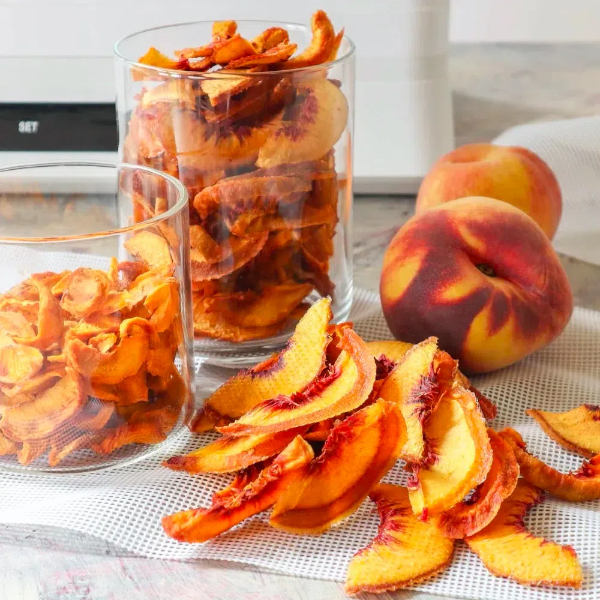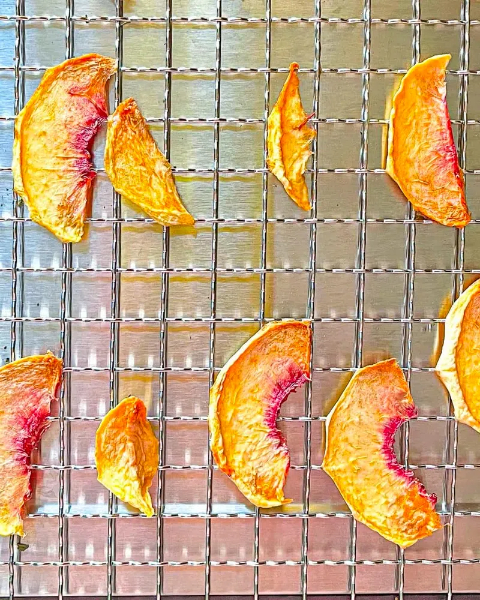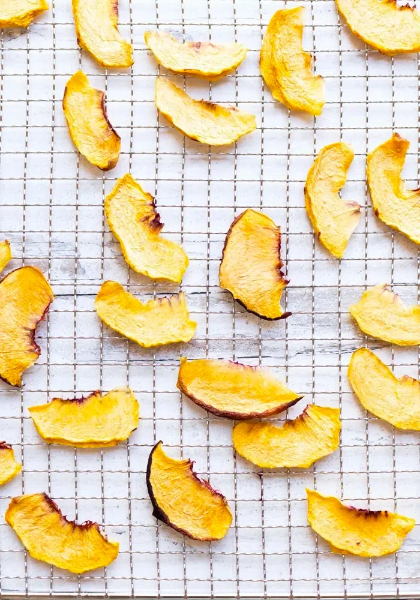
Content Menu
● Benefits of Using a Food Dehydrator
● Choosing the Right Peaches
● Preparation Steps
● Dehydrating Process
● Storage Tips
● Uses for Dried Peaches
● Alternative Methods for Dehydrating Peaches
>> Oven Drying
>> Sun Drying
● Tips for Best Results
● Nutritional Benefits of Dried Peaches
● Creative Recipes Using Dried Peaches
● Maintaining Your Food Dehydrator
● Types of Food Dehydrators Available
● Conclusion
● FAQ
>> 1. What type of peaches are best for dehydrating?
>> 2. Do I need to peel the peaches before dehydrating?
>> 3. How long do dried peaches last?
>> 4. Can I dehydrate frozen peaches?
>> 5. What should I do if my dried peaches feel sticky?
● Citations:
Dehydrating peaches is an excellent way to preserve their delicious flavor and nutritional value while creating a healthy snack. Using a food dehydrator simplifies the process, allowing you to achieve consistent results without the need for excessive heat or cooking. This guide will walk you through the steps of dehydrating peaches, including preparation, drying techniques, and storage tips.

Benefits of Using a Food Dehydrator
- Energy Efficiency: Food dehydrators are designed to use minimal energy compared to traditional ovens.
- Consistent Results: They provide a controlled environment for drying, ensuring even dehydration across all pieces of fruit.
- Preservation of Nutrients: Dehydrating fruits helps retain their vitamins and minerals better than other preservation methods.
Choosing the Right Peaches
When selecting peaches for dehydration, consider the following:
- Ripeness: Choose ripe but firm peaches. Overripe peaches may become mushy after drying.
- Type: Free-stone peaches are preferred as they are easier to pit and slice.
Preparation Steps
1. Gather Ingredients and Tools
- Fresh ripe peaches
- Lemon juice (optional, for preventing browning)
- Water
- A food dehydrator
- Cutting board and knife
2. Wash the Peaches
Rinse the peaches under cold water to remove any dirt or pesticides.
3. Prepare Lemon Juice Solution
In a bowl, mix 5 cups of cold water with 1/4 cup of lemon juice. This solution will help prevent browning.
4. Slice the Peaches
- Cut each peach in half and remove the pit.
- Slice each half into thin slices (about 1/4 inch thick).
5. Soak in Lemon Juice (Optional)
Place the peach slices in the lemon juice solution for about 10 minutes to prevent browning.
6. Drain and Arrange on Trays
Drain the peach slices and arrange them in a single layer on your dehydrator trays, ensuring they do not touch each other.
Dehydrating Process
1. Set the Dehydrator Temperature
Set your food dehydrator to 135°F (57°C), which is ideal for fruits.
2. Drying Time
Dehydrate the peach slices for about 6 to 12 hours. The exact time will depend on:
- The thickness of the slices
- The humidity level in your home
- The model of your dehydrator
3. Check for Doneness
The peaches are done when they feel leathery and no moisture is visible when torn apart. Some slices may finish earlier than others; remove them as they are done.
4. Rotate Trays
If your dehydrator has multiple trays, rotate them every few hours to ensure even drying.

Storage Tips
- Cool Down: Allow the dried peaches to cool completely before storing them.
- Storage Containers: Use airtight containers such as glass jars or vacuum-sealed bags to keep moisture out.
- Store in a Cool, Dark Place: Keep your dried peaches in a pantry or cupboard away from light and heat sources for optimal shelf life.
Uses for Dried Peaches
Dried peaches can be enjoyed in various ways:
- As a healthy snack on their own
- Added to trail mixes
- Incorporated into baked goods like muffins or cookies
- Rehydrated in recipes that call for fresh fruit
Alternative Methods for Dehydrating Peaches
While using a food dehydrator is highly recommended, there are alternative methods you can explore:
Oven Drying
1. Preheat your oven to its lowest temperature setting (ideally between 120°F to 140°F).
2. Arrange peach slices on wire racks placed over baking sheets to allow air circulation.
3. Keep an eye on them as they can take anywhere from 6 to 12 hours to dehydrate, depending on thickness and humidity levels.
4. Rotate trays periodically for even drying.
Sun Drying
If you live in a warm area with low humidity, sun-drying is an option:
1. Prepare peach slices as described earlier.
2. Place them on clean screens or trays covered with cheesecloth.
3. Leave them out in direct sunlight during the day, bringing them indoors at night.
4. This method may take several days depending on weather conditions.
Tips for Best Results
- Slice Uniformly: Aim for consistent slice thickness (about 1/4 inch) so that all pieces dry evenly.
- Avoid Overcrowding: Ensure that peach slices do not touch each other on the trays; this promotes airflow and efficient drying.
- Use Quality Peaches: Fresh, ripe peaches yield better results than those that are bruised or overripe.
- Experiment with Flavors: Consider sprinkling cinnamon or nutmeg on peach slices before dehydrating for added flavor.
Nutritional Benefits of Dried Peaches
Dried peaches offer numerous health benefits:
- Rich in Vitamins: Dried peaches are high in vitamins A and C which support immune function and skin health.
- Dietary Fiber: They provide dietary fiber which aids digestion and promotes gut health.
- Low Calorie Snack: Dried fruits are generally lower in calories compared to many processed snacks, making them an ideal choice for weight management.
- Antioxidants: Peaches contain antioxidants that help combat oxidative stress in the body.
Including dried peaches in your diet can contribute positively towards overall health while satisfying sweet cravings without added sugars found in many snacks today.
Creative Recipes Using Dried Peaches
Dried peaches can be versatile ingredients beyond snacking:
- Peach Oatmeal Cookies: Incorporate chopped dried peaches into oatmeal cookie dough for a chewy texture.
- Trail Mix: Combine dried peaches with nuts, seeds, and other dried fruits for an energizing trail mix perfect for hiking or workouts.
- Peach Smoothie Bowl: Blend dried peaches with yogurt or almond milk along with fresh fruits to create a delicious smoothie bowl topped with granola.
- Savory Dishes: Add chopped dried peaches into salads or grain bowls for a sweet contrast against savory flavors.
Maintaining Your Food Dehydrator
To ensure longevity and efficiency from your food dehydrator:
- Clean Regularly: After each use, clean trays and surfaces with warm soapy water; avoid abrasive materials that could scratch surfaces.
- Check Seals: Make sure that seals around doors or lids are intact; this ensures proper airflow during dehydration.
- Store Properly: When not in use, store your dehydrator in a dry place away from moisture which could cause damage over time.
Types of Food Dehydrators Available
When considering purchasing a food dehydrator:
| Type | Description | Pros | Cons |
| Stackable Tray | Multiple trays stacked vertically | Compact size | Limited airflow |
| Horizontal Flow | Fans located at back or side allowing air circulation across all trays | Even drying | Takes up more space |
| Multi-functional | Can also be used as an air fryer or oven | Versatile | Higher price point |
Choosing the right type depends on your needs regarding space availability, budget constraints, and how often you plan on using it.
Conclusion
Dehydrating peaches using a food dehydrator is an efficient way to preserve this delicious fruit while enjoying its health benefits year-round. With just a few simple steps, you can create tasty snacks that are perfect for any occasion.
By following this guide, you can ensure that your dehydrated peaches are flavorful, nutritious, and stored properly for long-lasting enjoyment.

FAQ
1. What type of peaches are best for dehydrating?
Free-stone peaches are ideal because they are easier to slice and pit compared to clingstone varieties.
2. Do I need to peel the peaches before dehydrating?
Peeling is optional; however, leaving the skin on can add flavor and nutrients. If you prefer peeled peaches, blanching them briefly in boiling water can make peeling easier.
3. How long do dried peaches last?
When stored properly in airtight containers away from light and heat, dried peaches can last up to one year.
4. Can I dehydrate frozen peaches?
Yes! You can dehydrate frozen peaches without thawing them first; just slice them directly from the freezer.
5. What should I do if my dried peaches feel sticky?
Sticky dried peaches may need additional drying time. Return them to the dehydrator until they reach the desired dryness.
Citations:
[1] https://www.sustainablecooks.com/drying-peaches/
[2] https://modernharvest.ca/dehydrating-peaches/
[3] https://flouronmyface.com/dehydrated-peaches/
[4] https://recipesworthrepeating.com/how-to-make-dehydrated-peaches/
[5] https://www.youtube.com/watch?v=-aUBV7bRYO0
[6] https://www.gettystewart.com/how-to-dehydrate-peaches-fresh-frozen-or-canned/
[7] https://thehomeintent.com/how-to-dry-peaches/
[8] https://www.freshoffthegrid.com/dehydrating-peaches/
[9] https://www.backpackingchef.com/dehydrating-peaches.html
[10] https://www.southernplate.com/dehydrating-peaches-and-recipes/











